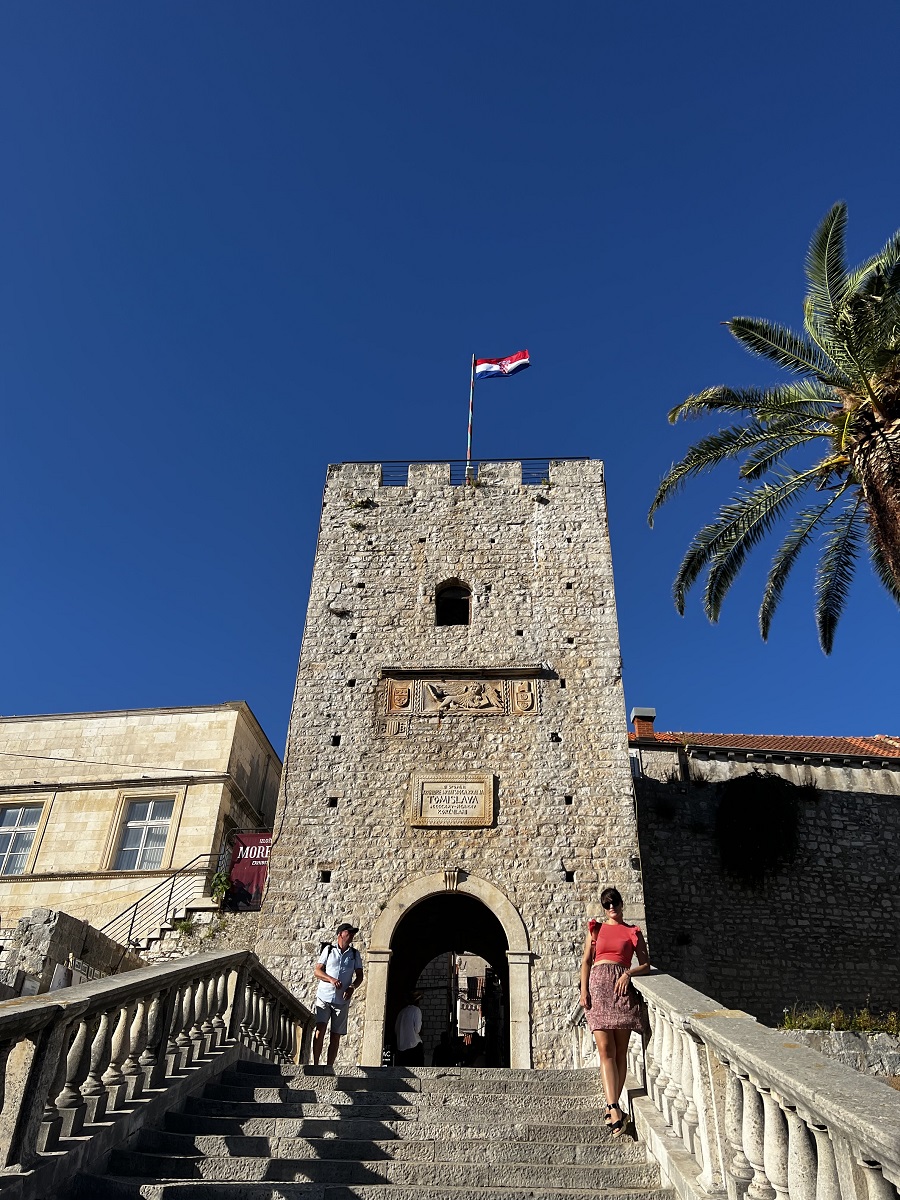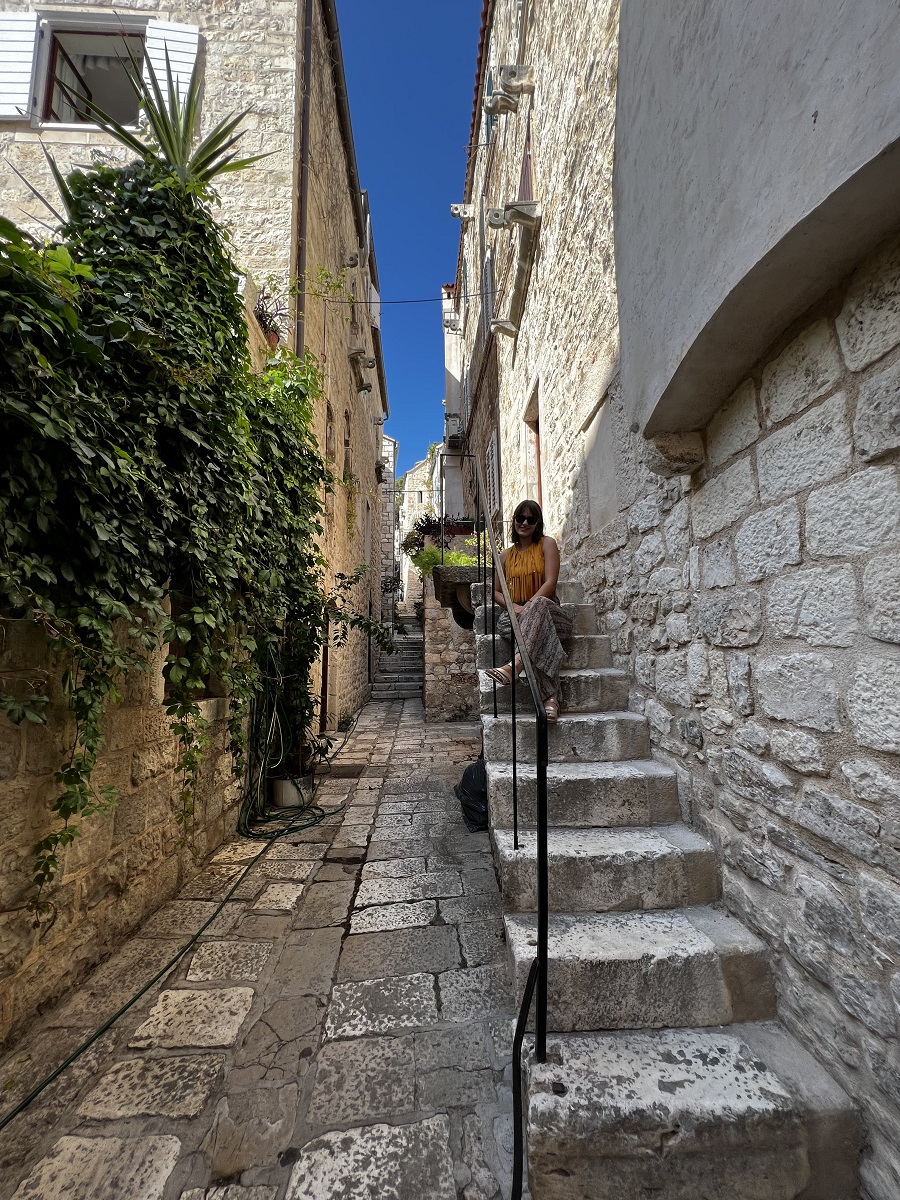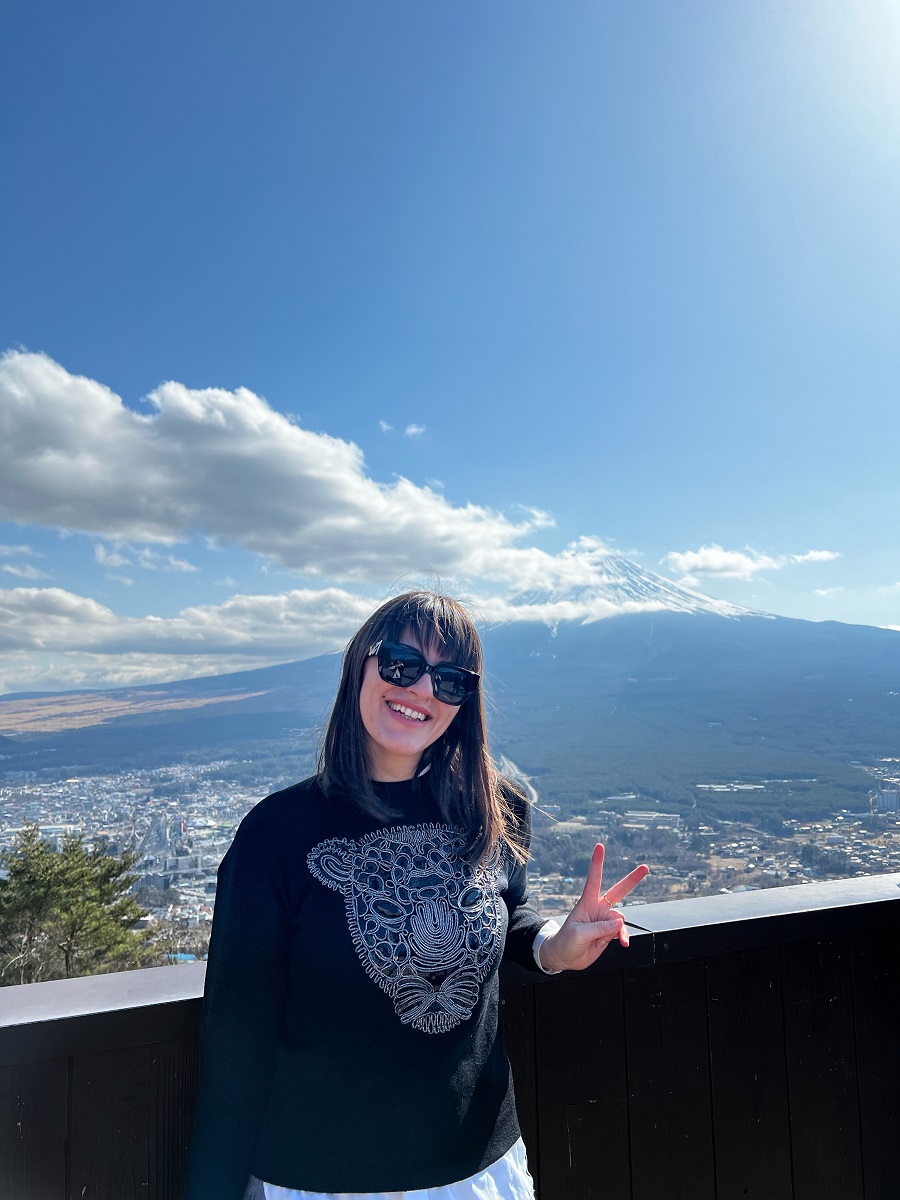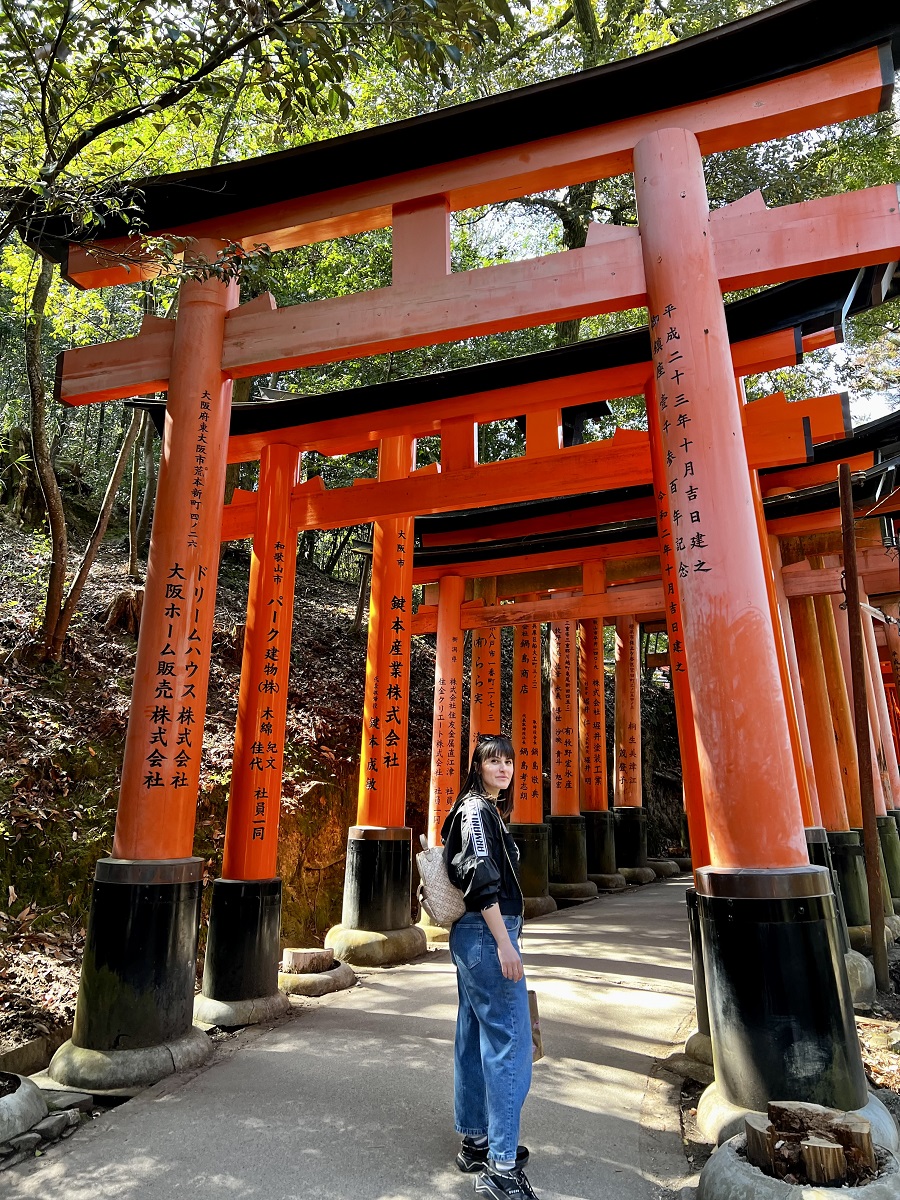European Commission Approves Google's Purchase of Croatian Photomath
March the 30th, 2023 - The European Commission (EC) has finally given the green light for Google to purchase the Croatian Photomath, the brainchild of the remarkable entrepreneur Damir Sabol.
As Josipa Ban/Poslovni Dnevnik writes, as stated above, the European Commission, more precisely the body's Directorate General for Market Competition, has approved Google's purchase of the genius Croatian Photomath.
"The European Commission has concluded that the transaction does not lead to a distortion of market competition within the European Economic Area," the Commission's decision reads. With this decision, the conditions for the implementation of the takeover agreement, which Google and Photomath signed back in May 2022, have officially been met.
This will also be one of the biggest acquisitions of a Croatian technology company ever, and as touched on above, we are talking about the company that Damir Sabol founded back in 2016, which developed an extremely innovative application (app) for solving all kinds of mathematical problems.
Google requested the approval of this takeover from the European regulatory body for the protection of market competition on February the 21st this year, and the decision was finally made this week.
The amount for which Google bought one of the most successful domestic apps ever made, which has been downloaded as many as 300 million times, is still unknown, but it is speculated that it is an acquisition that could be one of the largest in the domestic technology sector to have ever occurred. So far, the biggest yet is the 2020 takeover of video game maker Nanobit by Sweden's Stillfront for 148 million US dollars.
The Croatian Photomath is registered right here in the City of Zagreb, but also across the pond over in the USA. According to the data kept by Poslovna Hrvatska/Business Croatia, the domestic branch generated a massive 5.85 million euros in revenue back in 2021. On top of all of that, entrepreneur Damir Sabol successfully attracted a total of 29 million US dollars of investments in a mere six years. The last one, carried out a couple of years ago, from Menlo Ventures, GSV Ventures, Learn Capital, Cherubic Ventures and Goodwater Capital, was worth 23 million dollars.
This is the third company that Damir Sabol founded and developed and the second that he has successfully sold. The first was Iskon, which was sold to Hrvatski Telekom/Croatian Telecom for 100 million kuna. He then founded Microblink, which develops mobile document scanning, and Photomath was created as its spinoff. Silversmith Capital Partners invested 60 million dollars in Microblink back in 2020, but Sabor remained a co-owner of this company.
For more, make sure to check out our dedicated business section.
How to Croatia: Reporting Crime to the Croatian Police as a Foreign National
March the 29th, 2023 - While we always hope crime won't come knocking, it can and does, and sometimes more often than most of us would like. If you're a foreign national in Croatia, reporting a crime to the Croatian police might seem daunting. It need not be.
Croatia is an extremely safe country and the vast majority of crimes are not heinous when compared to other countries. This little nation of just under four million inhabitants prides itself precisely on its enviable level of safety, and the chances are you'll never need this information. That said, crime can and does happen, and it's important to know the steps you need to take if you end up caught in the middle of a legally punishable offence. Whether you're living here or just visiting, knowing how to report a crime to the Croatian police is an important bit of knowledge to have, even if it takes up space only in the back of your mind.
The Croatian police are available to the public 24 hours per day, seven days per week, and you'll often see them wandering or driving around. This is especially the case in larger towns and cities, as well as in tourist destinations during the warmer months. In tourist destinations which aren't otherwise towns or cities with a large number of residents outside of the tourist season, or if you're in a rural area, you'll naturally see less police presence.
In emergencies
Unlike in the UK or the USA, you won't need to call 999 or 911, but 192.
You can also approach any Croatian police officer you see in the area.
You can also go to the nearest police station to you to report a crime, and you can do so while choosing to remain anonymous if you so wish, although it's worth noting that this does depend on the way you've decided to report the crime in question. I'll explain that in more detail below:
If you don't go in person to the police station but instead choose to contact the authorities in writing, you don't need to provide any of your personal information.
If you do go to the police station in person, you must still provide the personal information the officer(s) ask for, and a record of the situation will also be made and kept.
If it isn't an emergency
Just like in any other country, you shouldn't call 192 unless the situation you're in is an emergency which requires a quick response from the Croatian police. While this country has far less inhabitants than most others in Europe, and is absolutely not comparable in this sense to let's say, France or the UK, resources are still stretched thin and police officers do need to be available for actual emergencies.
In the case of you not needing a quick police response, you can always submit your report to the police (in writing) or to the State Attorney's Office.
Caveats
Most people in Croatia speak some degree of English. The level of English fluency is incredibly high in this country and you wouldn't be being ignorant or unwise to expect to come across a police officer who can at the very least communicate the basics with you or understand what you need. Once again, in more rural areas of the country, the level of spoken English is naturally less, and this is also the case for the authorities working there.
If the first Croatian police officer you speak with struggles to communicate with you, and you're not able to convey what you need to in Croatian, an officer or other police staff member who does speak English or your native language (presuming it is German, Spanish, Italian, French or another widely spoken language) will be found to make communication more concise and easier.
Here in Zagreb at least, the Croatian police have been busy intensively brushing up on their English language skills in order to make themselves more available to foreign nationals who might end up running into trouble of some kind.
Most Croatian police officers are friendly and approachable. If you've been a victim of a crime or if you've witnessed a crime, don't hesitate to make the appropriate contact.
Croatian police officers are free to ask anyone, at any time, to produce their ID card or other form of government-issused photographic identification. This can also be a residence permit or a passport. Remember, you're supposed to carry a form of ID on your person at all times in Croatia, and while leniency with foreign visitors is a given, residents and citizesn can end up being landed with a small fine if they fail to provide this at the officer's request.
The Croatian police carry guns. They rarely ever have to be used.
For more on living in or moving to Croatia, make sure to check out our dedicated lifestyle section and keep your eyes peeled for our How to Croatia articles which are published every Wednesday.
Croats Living in Croatia, Earning Abroad: Monika Boshkova in Zagreb
March 29, 2023 - The Croatian dream - to live in Croatia and get income from abroad. Meet the locals who are living that dream, and find out how you could, too, in a new TCN series. In the latest in the series, a guest from North Macedonia, who is enjoying life in Zagreb - meet Monika Boshkova.
Croatia, great for a 2-week holiday, but a nightmare for full-time living unless you are very rich, so the perceived wisdom goes. The Croatian dream is to live in Croatia with a nice income from abroad, as many foreigners and remote workers do. For Croatians, if I read the comments in my recent video, Croatia is the Best Place to Live: 8 Reasons Why (see below), salaries are too low and people are forced to emigrate in search of a better life.
While there is definitely an element of truth to this, it got me thinking. The era of remote work is here, and the workplace is increasingly global, with a labour shortage for many skills. It doesn't matter if you are from Boston or Bangladesh if you have the skills, desire, and work ethic, and are able to work remotely online. And while it is certainly true that salaries in Croatia are low, what about the opportunities that the global online marketplace offers? If foreigners can find ways to live in Paradise and work remotely, why not locals? Curious, I posted this on my Facebook and LinkedIn:
Do I know many Croats who are living in Croatia, but working remotely for international companies who would be interested in being part of a TCN interview series showcasing living in Croatia but earning online, including advice to others on how to get started? It could be an interesting series. If interested, contact me on This email address is being protected from spambots. You need JavaScript enabled to view it. Subject Remote Croatia.

Some 15 emails - and several inspiring stories - later, and I think we have the makings of what could be a rather interesting series, Croats Living in Croatia & Earning Abroad. So far, we have featured all Croatians, but here is a worth addition from North Macedonia now in Zagreb - meet Monika Boshkova.
I’m Monika Boshkova, originally from Macedonia, and I’m grateful to have chosen Croatia as my second homeland. I’ve always had an intense urge to explore the world. I told my parents when I turned 18, they won’t see much of me. Being an only child, especially here in the Balkans, they weren’t exactly thrilled with my decision, but I’m grateful they (mostly) supported my adventures.
While enrolled in Finance and Accounting in Skopje, I signed up for various volunteering projects, work, and different seminars whenever I got a chance worldwide. Until 25, I had visited more than 35 countries because of which I graduated a year later, but hey, it was the best decision that, as I later realized, shaped my entire future.
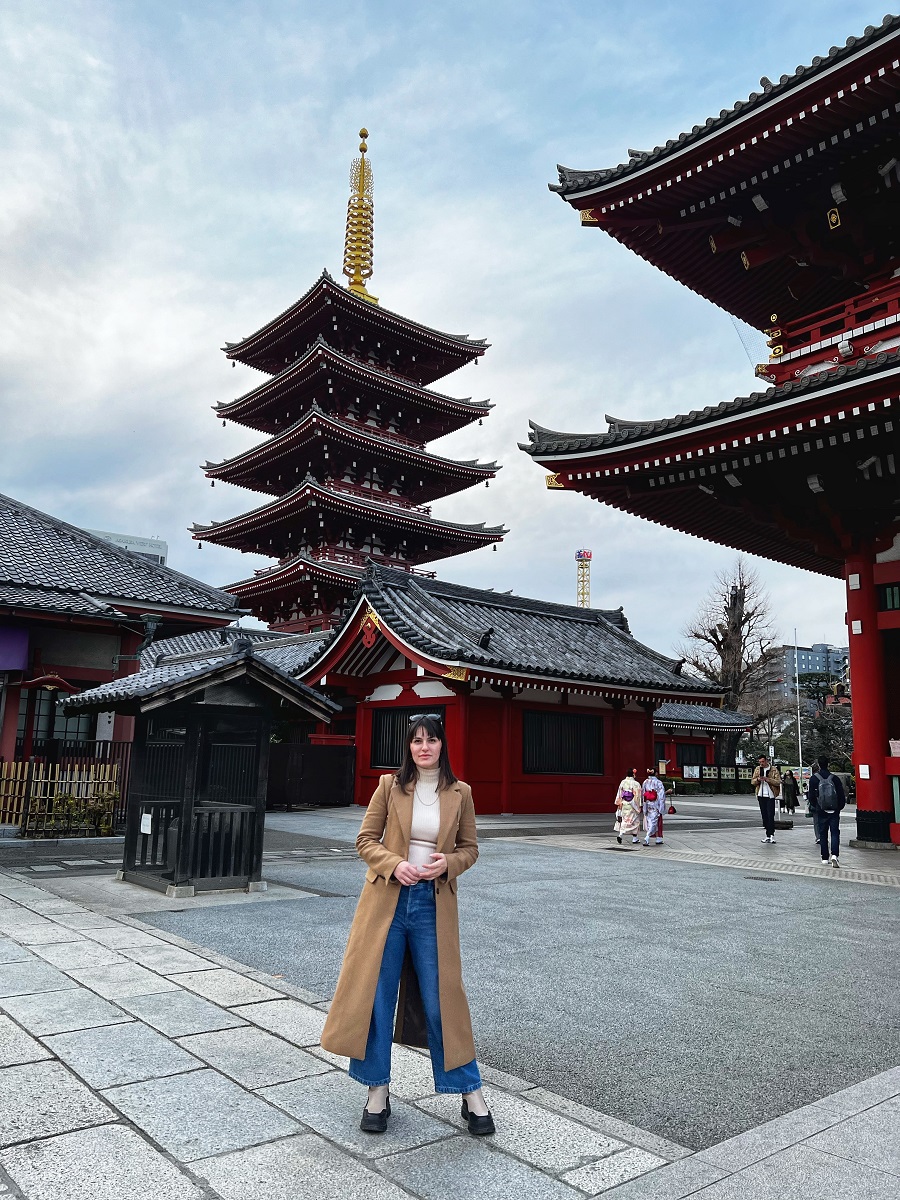
In the meantime, during university, I also started freelancing as a copywriter because all those trips weren’t going to finance themselves. Still, I never saw myself being self-employed at the time.
The decision came later when at 26, I moved to Prague to work in accounting and realized how unhappy I was with the set work and routine. By then, I continued freelancing simply because all the creativity I lacked in my full-time job gave me so much pleasure, and, well, who can say no to the extra income?
So, I finally connected the dots when I left my job in Prague in 2020, and because of my boyfriend, I decided to move to Zagreb. The next logical step was starting my own business, or the infamous obrt as they call it here.
1. Many Croats are emigrating, but you not only chose to stay but managed to achieve the Croatian dream - living here and working for an international company. Tell us how you did it.
Coming from Macedonia, I was already familiar with the Croatian culture, which helped me feel (more or less) at home. Still, just like in Macedonia, I couldn’t see myself thriving here on the set standard and afford the life I had envisioned for myself.
After leaving Prague, I was ready to settle somewhere, and by then, I realized that I loved the freedom that comes with freelancing and all the creativity that I would even work for free. Since then, it was just a matter of a few months of head bumping and arm wrestling with the Croatian bureaucracy to finally start my business venture.
Now, as a freelancer, I work with several clients; some on a long-term contract and some as one-time gigs, which is enough to fill 30–40 hours a week.
Copywriting for new and upcoming businesses, social media maintenance and ads, and organizing website background processes. This is more of a project management style of work with everything from hiring people, writing SOPs for particular workflows, publishing content, creating reports, and anything else that ensures the project goes by plan.
With my type of work, I could have chosen any other country to work from, but I’m happy that love brought me to Croatia. Falling in love with the country soon after was a no-brainer.
2. Looking for jobs based in Croatia can be a challenging task. How challenging was it for you to get where you are today - it must have taken a lot of determination and rejection.
At first, while I was still contemplating whether starting my own business would be too risky here and while still working on gathering all the needed documents to register my business, I tried to find a job.
I looked for something that matched my degree or my copywriting and online marketing skills but was stuck in the middle. Not enough experience in my field of studies but also freelance work was not particularly appreciated by the HRs of all the companies I applied to.
Somehow, starting my own business was inevitable for me. And now, looking back, I’m thankful no one took an interest in my CV.
3. If you can do it, presumably others can too. Are you aware of others who have had similar success but maybe in different industries?
Yes, I meet many people, whether Croats or other digital nomads, that live here while freelancing for international companies. IT is the biggest industry for remote work that pays well.
4. What is the general feeling among people in Croatia today? Is it possible to have a good life here, or is the grass greener on the other side?
For me, the grass was greener wherever I went during my period of traveling and adventures. I think that’s more so a mindset rather than related to an actual country, in this case, Croatia.
5. Apart from corruption and nepotism, low wages are often cited as a reason to emigrate. But the remote work revolution, as your example has shown, as well as the influx of many foreign workers to the likes of Rimac and Infobip, for example, show that a good quality of life IS possible in Croatia. What are your thoughts on that?
Of course. There is so much more to this country that people seem to forget, and I’m grateful that work like yours appears to be reminding them of it. I know income is the most significant factor in determining whether to stay, but if people were as proactive and worked as hard as they did when they went abroad, most would find their happy place under the sun here too.
Another significant “happiness” factor here is not depending on the government or anything connected to it, like the health system.
6. What advice do you have for others who would like to stay in Croatia but have no idea where or how to find a possible remote work job or business as you have managed to do?
Invest in yourself. Take some time to learn new skills, find out what you’re good at, and go for it. I know it sounds cliché, but those who find pleasure in their work consistently outperform those who simply work for the money.
In the first few years of starting my business, I may have made more money if I had stayed in finance and accounting working for someone else, but I would have been deeply unhappy even before I turned 28. That was simply not worth it for me.
There are tons of companies looking for remote workers on LinkedIn to begin with. A “low” salary for them is an excellent starting income for us here. Anyone can start with even the most basic tasks of a VA and then gather enough experience to move forward.
7. Three reasons you decided to stay in Croatia, and the one thing you would like to change in this country.
The warmth of this country, which to me represents the fiery nature of the people, the music, and, oh gosh, the food.
I like the values this country has mostly preserved as opposed to the Western world, so it’s very safe and the place to raise a healthy family.
The plethora of islands and mountains and the contrast between the north and the south regarding places to visit and beauties to see.
One thing I would like to change here is the mindset of most people. The ‘grass is greener’ thing. When you travel and live in several other countries, you see their shortcomings too and realize governments have ups and downs everywhere.
Sure, that’s an understatement for ours here, but changes start from the people, and we must be more appreciative of what we have. And maybe watch the mainstream news a little less; that’ll help unquestionably.
You can follow Monika Boshkova on LinkedIn.
****
Thanks Monika, very inspiring, and congratulations on all your success.
You can follow the rest of this series in the dedicated TCN section here.
If you would like to contribute your story to this series, please contact This email address is being protected from spambots. You need JavaScript enabled to view it. Subject Remote Croatia.
****
What is it like to live in Croatia? An expat for 20 years, you can follow my series, 20 Ways Croatia Changed Me in 20 Years, starting at the beginning - Business and Dalmatia.
Follow Paul Bradbury on LinkedIn.
Subscribe to the Paul Bradbury Croatia & Balkan Expert YouTube channel.
Croatia, a Survival Kit for Foreigners is now available on Amazon in paperback and on Kindle.

Grgich Hills Estate to Host “A Life Full of Miracles” Celebrating Miljenko “Mike” Grgich 100th Birthday
RUTHERFORD, CA., March 29, 2023 — Grgich Hills Estate is set to host a series of events known as “A Life Full of Miracles” to celebrate the 100th birthday of legendary Napa Valley winemaker Miljenko “Mike” Grgich starting on April 1, 2023. To mark the occasion, Grgich Hills Estate will release two highly collectible Centennial Celebration wines: the 2020 Paris Tasting Commemorative Chardonnay and the 2019 Yountville Old Vine Cabernet Sauvignon. The commemorative Chardonnay pays homage to the historic Judgment of Paris blind tasting in 1976 when Miljenko's wine scored the highest among French and California wines, changing the world of wine forever. The Cabernet Sauvignon is made from grapes grown in one of Napa Valley's oldest Cabernet vineyards, exemplifying Miljenko's tradition of excellence in crafting world-class Cabernet Sauvignon.
The birthday celebration will feature a multi-stream event accessible through the Grgich Hills official website. The centennial event will be hosted by Master Sommelier, Andrea Robinson. Guests attending the physical event at the Grgich Hills Estate will enjoy live entertainment and delicious food designed to complement these exclusive wines and Andrea will engage with friends of Mike from around the US and Canada who will share their stories about him. Mike will join the celebration from his winter residence with his family, including Violet Grgich, President of Grgich Hills Estate.
On May 19, 2023, Mike’s close friends, colleagues, associates and select members of the media will celebrate “A Glass Full of Miracles,” an exclusive event where select wines that represent Mike’s career in the wine industry will be featured. These include a selection of Grgich Hills Estate library wines, as well as those that he worked on while employed at other wineries- including Beaulieu Vineyard where he worked with Andre Tchelistcheff, his tenure at the Robert Mondavi Winery where he crafted the now famous “Fume Blanc” and 1969 Award Winning Cabernet Sauvignon, and finally at Chateau Montelena where he created the wine that won the “Judgement of Paris.” Many winemaking associates will be sharing their favorite personal stories about friendships with Mike and the wines they created with him. The following day, “A Life Full of Miracles” celebration will feature Croatian music and dancers in traditional costume, entertainment, and food created by renowned Iron Chef Masaharu Morimoto. Approximately 400 invitation-only guests will be attending on May 20, 2023, on the open-air patio at The Ranch House at Grgich Hills Estate.
On July 1, 2023, Grgich Hills Estate’s annual Wine Club Croatian Extravaganza will celebrate 46 years of exceptional wines and the founding of Grgich Hills Estate. Miljenko “Mike” Grgich’s 100th birthday will be celebrated highlighting his contributions to the art of winemaking as well as his Croatian roots. Entertainment will include festive Croatian music and dancers in traditional costume as well as a special menu of Croatian delicacies paired with Grgich Hills Estate special Centennial wines. This is a special milestone, and a limited number of tickets will be set aside for the general public, allowing Wine Club Members first access.
About Miljenko “Mike” Grgich: Born in a village in the former Yugoslavia, now Croatia, in 1923. Miljenko’s US-bound journey from his homeland on a UN student visa via Germany and Canada was an ambitious one. Arriving in Napa Valley in 1958, Miljenko worked with a succession of the most influential wineries and winemakers in Napa Valley: Lee Stewart at Souverain Winery, Brother Timothy at Christian Brothers Cellars, André Tchelistcheff at Beaulieu Vineyards, and Robert Mondavi at Robert Mondavi Winery before becoming winemaker and limited partner at Château Montelena. Miljenko’s lifelong principles are characterized by faith, hard work, perseverance, love of the earth, dedication to education, and to the blending of farmer's wisdom with scientific principles and the art of winemaking. Grgich was inducted into the Vintners Hall of Fame in 2008.
About Grgich Hills Estate: Grgich Hills Cellar became Grgich Hills Estate in 2003, sourcing only grapes grown on the 366 acres of certified organic vineyards. Grgich Hills Estate is certified organic, incorporating biodynamic principles in farming practices and a Napa Valley leader in Regenerative Organic Agriculture. Referred to as "Organic Plus,” regenerative farming is a science-driven approach focused on no-till soil management, building organic matter to sustain microbial life, incorporating livestock and biodiversity, and caring for people who work in the fields and winery. Recognized as one of the world’s "Top 100 Wineries" by Wine & Spirits Magazine in 2022, Grgich Hills Estate is in the process of becoming certified through the Regenerative Organic Alliance (ROA), a leading force in the Regenerative Agriculture movement worldwide, a key component of combating climate change.
Croatian Doctors Are Going on a Strike After Zagreb Protest
March 29, 2023 - Croatian doctors have announced a strike. Mirjana Livojevic, a doctor from the hospital in Sisak, recalls the last doctors' strike. It was ten years ago when she started working on her own. In ten years, she concludes, some things have remained the same, some have changed for the better, but some still have not. She said the strike could not wait, called Plenkovic out, and listed four demands the doctors would not give up on.
Index reports the conversation from RTL Direkt.
So you've definitely decided that a strike is the next step?
"Yes, I must say that we are certainly going on strike; we have not agreed on the exact date and form in detail," she said.
Is it a unique decision of all associations?
"It is a unique decision of all five umbrella associations in healthcare and all members at the meeting," she stated.
When is the earliest date?
"We cannot give exact dates because that decision will be made by the assembly of the Croatian Medical Union; they have the only right to do so. The assembly was previously scheduled for May 13, but that date is quite far away, so it is likely that an extraordinary assembly will be convened, which will then arrange a date," the doctor said.
"We will not wait for a decision on the strike," she added.
What is the legal procedure, a strike in the healthcare system must take place so that patients' health is not endangered in any way, right?
"That's right; our profession is very specific. For us, the patient always was and always will be in the first place. We will find a way to fight for our rights so that no one is endangered," she stated.
Doctors went on strike ten years ago during the SDP government, and they were introduced a work obligation, do you fear this will happen now?
"That was when I just started working. I remember that strike and the introduction of work obligations. Ten years have passed, things have changed a lot, some for the better, some for the worse, and some have remained the same, and that's one big reason why we are forced to go on strike. We were not heard," she said.
You held a protest ten days ago. Have you met with Minister Beros since then?
"Absolutely no one from the Ministry contacted us. We asked both before the protest and during for a meeting with the government. We were ignored by the Prime Minister and all government members, including Beros, who is in charge of the department and who should be the most interested," she said.
"I saw somewhere that Plenkovic and Beros met and that the prime minister authorized him to continue the talks," she claimed.
Are you calling on Plenkovic to solve the problem?
"We have been calling on him since the protest," she said.
No effect?
"It's not very nice to ignore people. On the one hand, they ignore you; on the other hand, they say they're open," she believes.
What would have to happen to call off the strike?
"The demands that are clear and simple should be met. The four demands that we have been repeating since September," the doctor said.
Compromise?
"We are not giving up on the four demands. Perhaps we can compromise within each, but none will be given up," she said.
Example?
"If it comes to that, and it will, after the formal announcement of the strike, there is a period called the conciliation process where the ministry will have the opportunity to express their ideas, where the unions will express theirs, then we can talk and agree on a compromise. We have days to resolve it, which is the period to resolve the situation so there is no strike. It depends on what they are ready to do, not to promise or establish a working group, but to do it," she concluded.
For more, make sure to check out our dedicated News section.
Croatia to Sign Trilateral Agreement to Control Illegal Migration
March 29, 2023 - Italy, Slovenia, and Croatia are launching trilateral cooperation to control illegal migration, as announced by the Prime Ministers of Croatia and Slovenia, Andrej Plenkovic and Robert Golob.
As Index writes, the Slovenian Prime Minister said at a press conference in Brdo castle near Kranj that Schengen made it easier for many Slovenians to travel to Croatia and that Ljubljana's support for Croatian membership was the "correct decision" in its national interest, as shown by the higher number of arrivals of Slovenian citizens this year.
Unfortunately, Golob continued, in the same period, there was also an increase in the number of illegal migrants entering Slovenia, which is why it is in the common interest to establish as good a control over the external borders of the European Union as possible.
Therefore, the two countries, which are only transit for illegal migrants, together with Italy, the country that is their final destination, will start a trilateral cooperation for monitoring migration.
The Slovenian Prime Minister said that Slovenia and Italy are not going in the direction of directly helping Croatia to protect the border because that is within Croatia's jurisdiction and "it has enough of its forces," but rather "in-depth" surveillance, from the border to the final destination, is being considered.
Trilateral cooperation, the most important for Italy as a destination country, could be launched very soon, even before Golob visits Zagreb, which is planned for May, the Slovenian Prime Minister said.
Plenkovic: We want to send a message of reliability
Plenkovic said at the conference that Croatia has an "extremely demanding" task of guarding the EU's external border, which 6,700 police officers work on and which is why "huge" investments in police readiness and surveillance technology have been made.
He emphasized that Croatia is ready for trilateral cooperation and that the Minister of the Interior, Davor Bozinovic, visited Italy the day before "precisely on the topic of migration policies."
Plenkovic said that Croatia wanted to send a "message of reliability" and added that Golob referred to the "good impressions" of Danish Prime Minister Mette Frederiksen, who visited the National Coordination Center for Border Control (NCC) at the beginning of the month.
"We are ready to sign the agreement on police cooperation that has already been prepared, and I believe that these technical aspects will be resolved by the time Prime Minister Golob arrives in Croatia," said the Croatian Prime Minister, adding that the cooperation will be "effective, reliable and compliant with regulations."
Bozinovic: Food shortages and earthquakes increase migration
Minister Bozinovic said at the very beginning of the month that the number of illegal migrants entering the EU is approaching the level of 2015 and 2016.
Bozinovic then said that migrants, like before, mostly come from the Middle East and North Africa, but that due to the liberalization of the visa regime in the neighborhood, "primarily in Serbia and Bosnia and Herzegovina," residents of countries such as Burundi and Cuba are also arriving.
He emphasized that one of the causes of the greater number of migrations were the consequences of Russian aggression against Ukraine, which disrupted the world's economic flows and pushed a large number of people below the poverty line but also threatened the food supply of precisely those areas that had previously had such difficulties.
The large number of arrivals was also influenced by the catastrophic earthquakes in Turkey and Syria, which occurred where many refugees from Syria and other countries resided.
For more, make sure to check out our dedicated News section.
Croatian Olive Oil Among Best in the World, Wins Gold Medals in NY
March 29, 2023 - It is no secret that Croatian olive oil is among the best in the world. And it excelled yet again at the annual competition in New York, with only Italy and Spain, the largest global producers of olive oil, winning more medals.
"Bravo Tom, Bravo Eva!" congratulations were directed at the Croatian olive oil producers, winners of the first prizes at the NYIOOC 2023, report Agroklub/Poslovni.
"Here at last, Oblica," replies Tomislav Duvnjak, head of the St. Ivan Olive Oil Center in Vodice. He doesn't hide his satisfaction that his oil from the local variety is this time decorated with gold. Last year, at this same competition, his extra virgin oil St. Ivan Oblica won the silver medal.
Duvnjak is otherwise known as the man who two years ago encouraged olive growers from Dalmatia, Croatia's largest olive-growing region, to organize a shipment of oils to New York for the world's largest and most prestigious olive oil competition.
Since then, they have recorded the greatest successes. Last year, in competition with 1,244 samples from 28 countries worldwide, Croatian olive oil producers, mainly from Dalmatia and Istria, won 96 awards (69 gold and 27 silver).
"We are third in the world. It is the biggest success so far", commented Duvnjak.
Only Italy (158 medals) and Spain (128) are ahead of Croatia, countries that are also the largest producers of olive oil in the European Union, but also in the world. In terms of olive oil quality, Croatia is followed by the United States of America (94 medals), Greece (79), Turkey (65), Portugal (35)... This year, 1,100 samples from the northern hemisphere countries arrived at the NYIOOC, of which 126 oils came from Croatia (61 from Dalmatia).
With Duvnjak's St. Ivan Oblica, an award also went to the Eva Marija Levantinka brand owned by OPG Eva Marija Čurin from Gdinj on the island of Hvar. It is an extra virgin oil that is characterized by its fruitiness. This OPG was founded in 1997 and is located in the favourable area of Gdinj, on the eastern side of the island of Hvar. The estate comprises five hectares of specialized olive groves with 1,000 trees and overlooks the Adriatic Sea (225 meters).
"All the fruits are hand-picked in the first half of October and processed within 24 hours using a cold extraction system", points out Eva Marija Čurin, who has already proven herself by winning several awards at domestic and international competitions for olive growers and oil producers.
For more, make sure to check out our dedicated News section.
Luciane Choucate, Brazilian Chocolatier Makes Artisan Chocolates in Croatia
March 28, 2023 - Although the shelves of Croatian shops are full of various chocolates, which come in seemingly countless flavors, there are very few domestic producers of quality and artisan chocolates. Most of them are true enthusiasts, focused on the quality of raw materials, committed to developing the best recipe, and achieving a unique chocolate taste. They make them carefully, in small batches, with quirky toppings, for all those who like to enjoy their chocolate meaningfully and slowly. Luciane Choucate, a Brazilian chocolatier, makes her chocolates right in the heart of Croatia, in Samobor.
Luciane Choucate comes from Salvador, the capital of Bahia on the northeast coast of Brazil, and has been associated with chocolate since she was young. Partly because her hometown is one of the key areas for cocoa production, without which there would be no chocolate: "My state is the largest producer of cocoa in Brazil, where production began in the middle of the 18th century. Thanks to cocoa, a strong agricultural industry developed, with numerous social and political consequences. Today, Bahia stands out for producing, in my opinion, the best quality cocoa in the world," Luciane told Jutarnji.
"My story with chocolate started when I was 13 years old. I had two cacao trees in my yard, so I tried to make chocolate from the beans but didn't have very good results. Many years later, as an adult, passion led me to try again, but this time I educated myself first. I attended bean-to-bar courses in Canada and Brazil and educated myself about the production and processing of cocoa on farms and in agro-industry institutes, considering that the raw material determines the final taste of the chocolates. And I tried, tried, and tried... More than ten years have passed since I started producing bean-to-bar chocolates. Since I already had my small production in Brazil, when I arrived in Croatia in 2018 I started looking for ways to find the necessary raw materials and equipment within the EU. Now I can also produce a small batch of high-quality chocolate here," Luciane is proud.
When it comes to chocolate, he points out that the main challenge in Croatia is acquiring the primary raw material, i.e., cocoa beans: "In Brazil, I was able to visit farms, observe the harvesting and processing, and choose the batches of cocoa fruits (lots) that interested me the most, even choose cocoa by variety. Here in the EU, I buy cocoa from companies that import cocoa beans, but I'm already working on getting the best cocoa in the world, the one from my state, Bahia. I have good contacts with very high-quality producers there," she explained. The procurement of cocoa beans itself is a complex and important process, not only for the sake of quality but also for the flavour profile that individual cocoa beans can provide: "Just like wine, which depends on the grape variety, soil, and climate, no cocoa vintage is the same. And that is amazing!!! As my husband likes to say, nature does not have an ISO 9000 quality standard. Every vintage brings new opportunities, challenges, and flavours. Just like wine that comes from different grape varieties, cocoa also has different varieties, such as Catongo, Para-Parazinho, Ipiranga, and others. Chocolates can also be blends of several varieties or from cacao trees from only one locality," she pointed out.
Living in Croatia and a smaller town like Samobor has great advantages for Luciane: "What stands out most here for all Brazilians is safety. It is freedom. My family and I have adapted very well to Croatia, we have made many friends, and life in Samobor is a dream for those who have always lived in big cities. Croatia is a beautiful country, with mountains, rivers, lakes and the sea that is very close. Nature is respected... We love living here," explains the warm-hearted Brazilian and adds: "Another very important thing! Just like Brazilians, Croats are passionate about coffee! I like to sit and enjoy coffee at my own pace," she smiled.
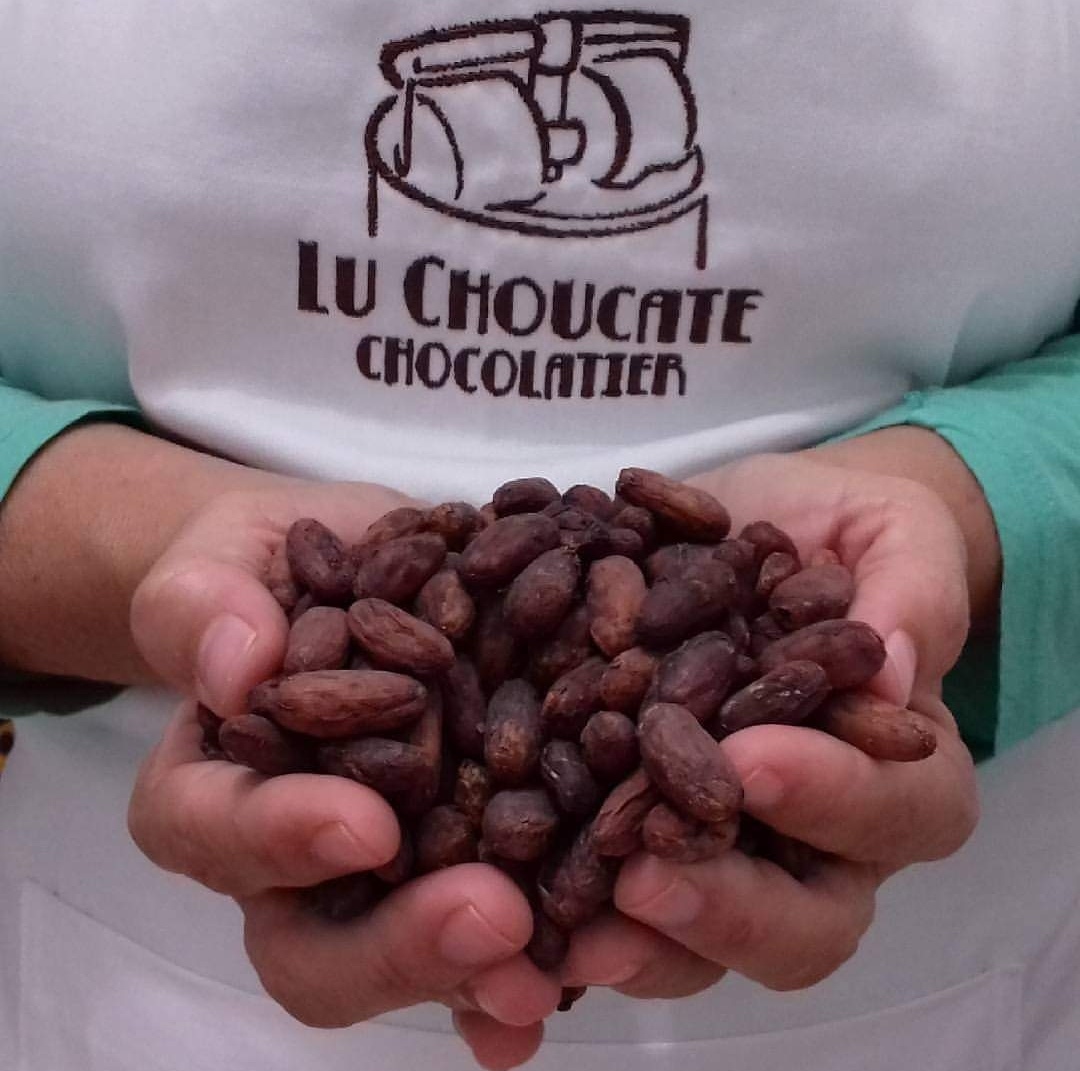
Luciane currently offers four types of chocolate, dark with 72% cocoa, milk with 52%, milk with 52% cocoa and coffee, and white chocolate. The positive reactions of her customers when they taste Lu Choucate chocolates for the first time never fail: "The reaction is always very good. People are impressed with the taste of real chocolate, how they can taste the fruit of the cocoa tree, as well as the fact that dark chocolate can be very smooth and milky chocolate can be strong. Or how white chocolate, otherwise a source of discord, is actually not that sweet". She also described her process of coming up with chocolates: "I always research and listen to what people like and want. I always strive to keep the cocoa content high and work to get the best possible flavour out of it. I start by designing the recipe, ensuring the cocoa solids and cocoa butter ratios are well balanced without losing the cocoa flavor. Then we produce chocolates in small batches to test the whole process and do many tastings, where friends are always welcome to give their opinion."
Lu Choucate chocolates can be ordered via @luchoucatechocolatier on Instagram and Facebook and via the e-mail address This email address is being protected from spambots. You need JavaScript enabled to view it.. Luciane notes that she is actively working to make her chocolates available in specialized stores. The price of one chocolate bar is three euros, but she points out that her customers usually order several at once, which she encourages for the sake of the financial sustainability of production. She has no shortage of good ideas, from the thoughtful expansion of the range to business development: "The plan is to set up a factory/shop with a cafe where people will be able to see the production of chocolate that they taste in all stages," she emphasized and added: "I never get tired of hearing comments of people who have truly tasted chocolate for the first time. I love it! I'm passionate about my work," she says with a smile and returns to the rented kitchen where the latest batch of delicious artisan chocolates will soon be created.
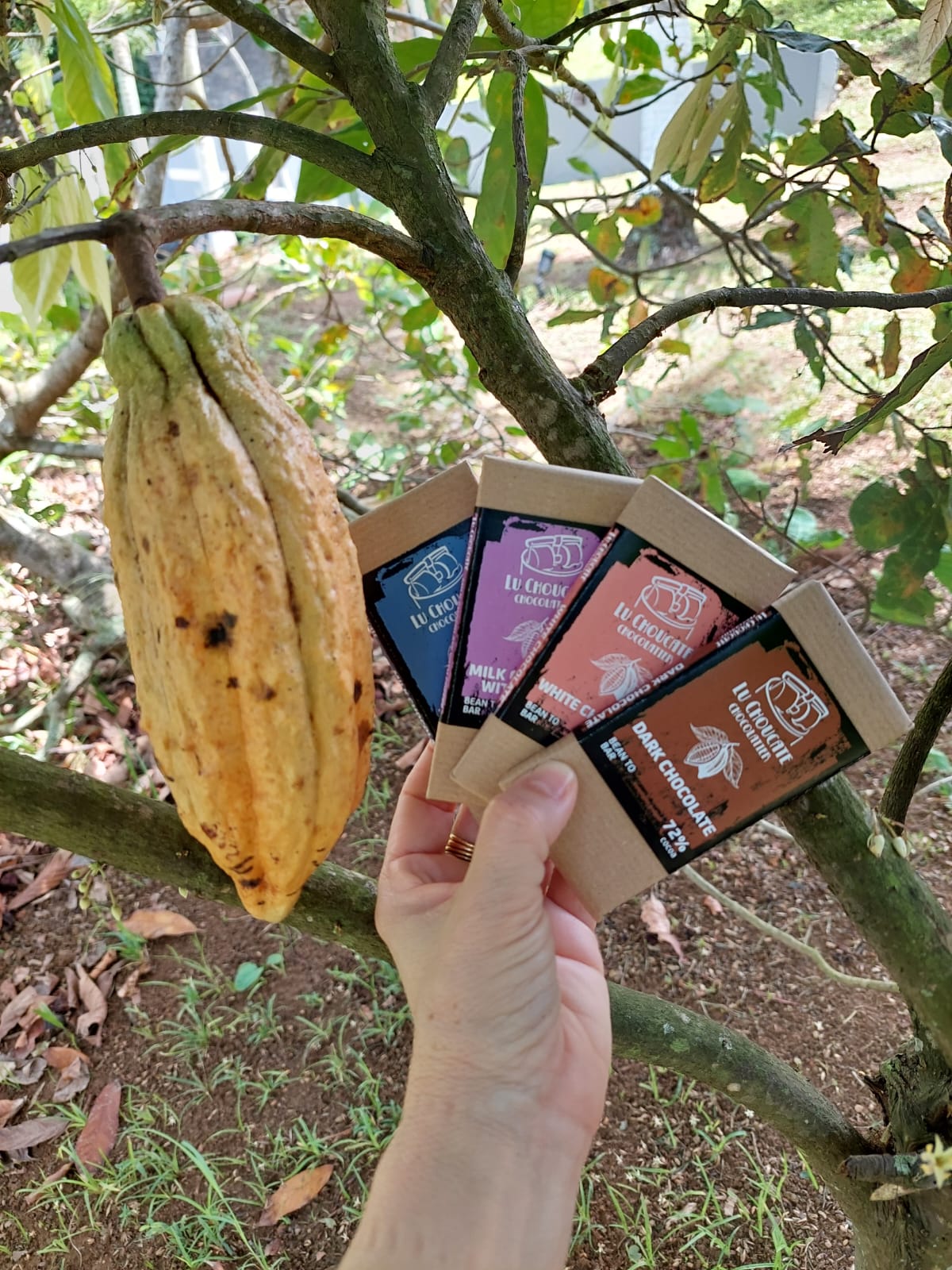
Bean-to-bar chocolate production
Production begins on the farm by selecting the best batches of cocoa fruits (lots), harvesting, fermentation, and drying. Lot selection even includes random cut testing of cocoa pod samples to confirm proper fermentation and drying.
Manual selection is done in the factory to separate only the best grains and remove all impurities. Only perfect grains are then roasted. The roasting affects the final taste of the chocolate, and the beans can be milder or more roasted, depending on the recipe and the potential of the cocoa bean itself.
After roasting, the cooled beans are broken, and the shell is separated, which results in smaller cocoa nibs. "The grains go through purification, for which I use mills or melangers that have stone rollers that mix the grains," Luciane described. This reduces the size of the particles, and the resulting chocolate liqueur is exposed to oxygen, eliminating unwanted volatile substances. Next, the melanger refines and concocts the cocoa simultaneously, which can last 48, 72, or more hours. Now the formed chocolate is tempered, during which crystallization is controlled, and then poured into molds. In the end, the chocolate bars are packed and ready for consumption. This whole process takes two to three weeks.
For more, make sure to check out our dedicated Lifestyle section.
5 Things Rwanda Does Better Than Croatia
March 28, 2023 - Two countries devoured by war a generation ago. Learning from excellence is an inspiring thing - 5 things Rwanda does better than Croatia.
It is a strange thing, being an expat. Or an immigrant, as some people prefer me labelled. A country you live in becomes a part of you, will never leave you.
And after over 20 years in Croatia, I have never lived longer anywhere else. And I am very happy here.
But there is one other country I lived in for almost a year that refuses to leave me.
Rwanda.
1994 in Rwanda was among the biggest hellholes of the 20th century. Arriving just a week after a genocide which killed 800,000 people in 100 days (almost 12% of the population) is an experience I wiill never forget. Nor those intense months afterwards, working 20 hours a day to provide food security for the survivors to start again. Rwanda - much like Dalmatia - is my blood, but for very different reasons. She made me cry as a 53-year-old when I finally went for my first counselling at the tender age of 53 last year.
I have followed the journey of that tortured Central African countries for the last 30 years, a journey of dictatorial democracy, reconciliation, and tentative steps of hope for the future.
It is a country that I have allocated more than my fair share of my emotional well-being to over the years, as well as my tears. I will never forget the face of my 4-year-old daughter on April 6, 2014 - the 20th anniversary of the genocide.
It was 6 am on the idyllic island of Hvar when my youngest woke and came to say hi to her blogger father on the couch, who was in tears. A combination of memories and this excellent article in the New York Times, called Portraits of Reconciliation.
"What's wrong, Daddy?" asked the confused child, who had never seen a grown man - let alone her father - cry.
"Nothing," I answered, holding her tighter than I have ever held a human in my life.
"It was just something bad that happened in Africa a long, long time ago." And then I strengthened my grip.
Comparison is the thief of joy, and no two countries are alike. It would also be wrong to claim that 'democratic' Rwanda is a true democracy, as the experiences of my Rwandese friends will testify. And yet...
One of the poorest countries in the world, which lost an eighth of its population in 100 days, the latest - but certainly not the first - genocide. Some 30 years later, it has emeged a lot brighter than many might have predicted. And when I look at my adopted homeland of Croatia, I see parallels, and I see lessons to be learned. Here are 5 things that I think Rwanda is doing better than Croatia - all of which would be very welcome for Croatia to emulate - which it can.
1. A ban on plastic bags in the whole country since 2009
I have lost count of the number of articles I have read - and written - about hotels which are proving their environmental credentials by banning the use of things such as plastic straws. Rwanda banned plastic bags in the whole country back in 2009. The whole country, enforced with fines and even the threat of imprisonment.
2. Emergency blood delivered by drone within 30 minutes all over the country
Medical emergency? How to get that emergency blood? For more than 6 years now in Rwanda, a doctor names his requirements, and within 90 seconds, a drone is on its way with a life-saving package - ETA maximum 30 minutes.
3. Reconciliation
As a Brit, with no experience of civil war in my country, it is hard for me to comment with authority on the effects of civil war. Having lived in both Rwanda and Croatia, however, I can see the healthier way forward - reconciliation. And while my 7-year-old child got her first nightmare with her homework in school (Read more in Is it Really Necessary to Poison the Minds of the Next Generation?), the comprehensive rehabilitation process performed in Rwanda has gone a long way towards healing. No longer Tutsis and Hutus, we are all Rwandan now.
Contrast that with the ongoing torment of Vukovar, a city not reconquered, but handed back, where schools are still divided, those who perpetrated horrific crimes encounter their victims on a daily basis, and where politicians stoke the hatred for politcal gain a generation on.
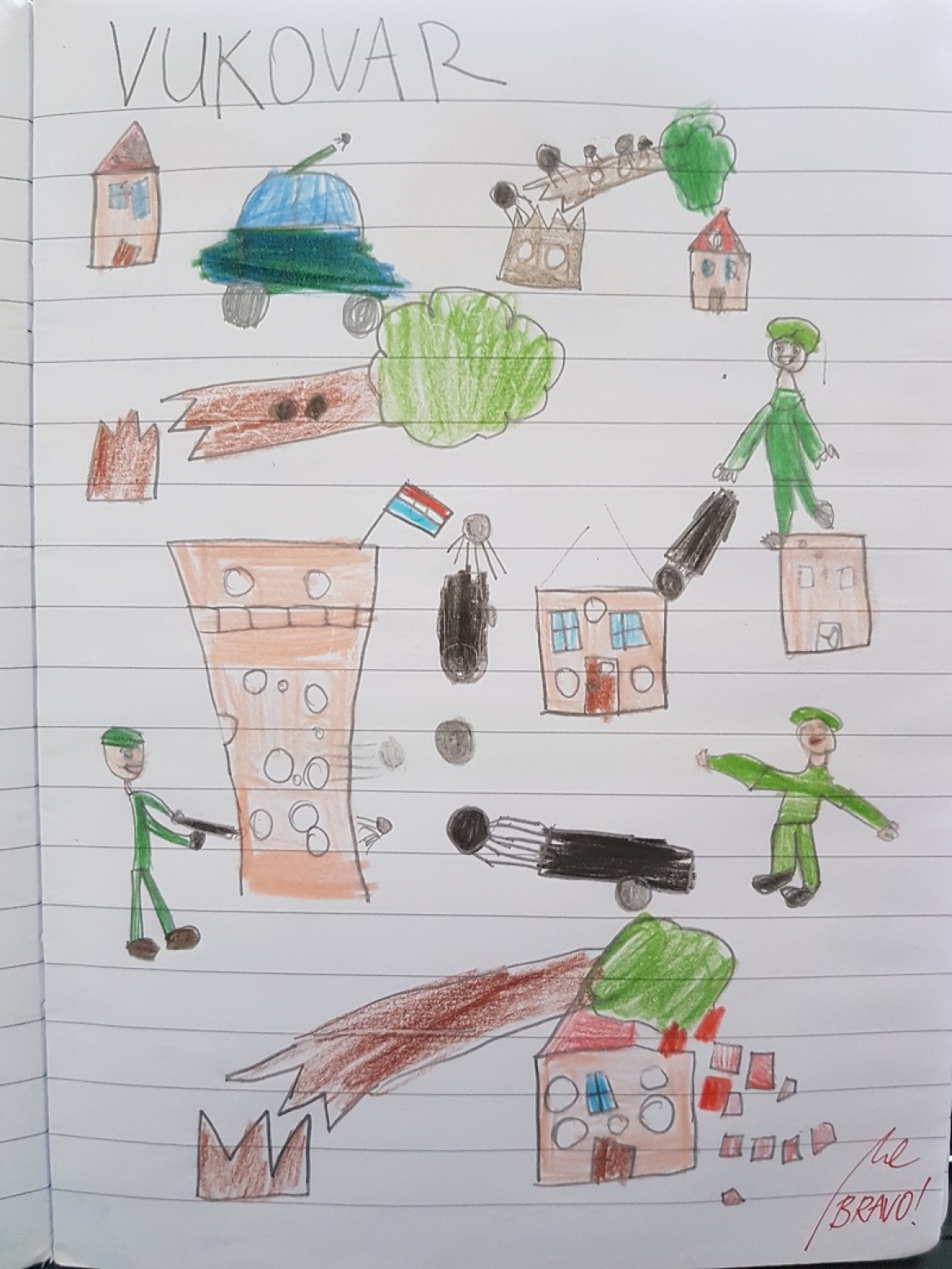 ,
,
4. Tourism
The land of 1000 islands had been usurped by the land of 1000 hills. On the face of it, Rwanda doesn't have that much going for it regarding tourism, apart from a few mountain gorillas, but man, have they done an amazing job with what they have. So much so that in 2019, Bloomberg named Rwanda as one of the top 10 destinations in the world for billionaires. And they had plenty more to say on the subject in How Rwanda Became the Unlikeliest Tourism Destination in Africa. And not just Bloomberg, here is the Robb Report - Rwanda Is Building a Low-Footprint, Luxury Tourism Industry From Scratch—and Succeeding.
An intresting strategy - building a tourism industry rather than just waiting for tourists to arrive as in Croatia...
5. Tourism Promotion
And perhaps my favourite of the five - tourism promotion. In 2018 Croatia was one of the most-searched countries on the planet, its players and fans adored all over the world for their World Cup heroics in Russia. If ever any country had the moral high ground to claim to be the tiny country that dared to dream, and to cash in commercially on that footballing success, it was Croatia.
And yet, with the Kings of Accidental Tourism congratulated themselves on a job well done (not by them, but by others, as usual), tiny Rwanda, a country that had never been to the World Cup, never had a player in the Premier League, stole the show with a sponsorship deal with Arsenal - the first sponsorship deal between a tourism country and a Premier League team - which saw Visit Rwanda seen on Arsenal shirts around the world 35 million times a day. You can read more in my article a few years ago in Lessons from Rwanda: Promoting Tourism Through Football, African-Style.
****
You can subscribe to the Paul Bradbury Croatia Expert YouTube channel here.
What is it like to live in Croatia? An expat for 20 years, you can follow my series, 20 Ways Croatia Changed Me in 20 Years, starting at the beginning - Business and Dalmatia.
Follow Paul Bradbury on LinkedIn.
Croatia, a Survival Kit for Foreigners is now available on Amazon in paperback and on Kindle.

Luxury Istrian Resort Introducing Offer to Entice Golf Lovers
March the 28th, 2023 - One luxury Istrian resort is set to raise the level of its offer this year, with a special emphasis placed on enticing golf lovers to the beautiful Istrian peninsula.
As Poslovni Dnevnik writes, one luxury Istrian resort, known as a prestigious five-star golf and spa resort, is opening its doors this year again. Located in Istria, near Savudrija and Umag, Kempinski Hotel Adriatic is bringing in some new content with which it will raise its business to an even higher level.
From this year on, this popular luxury Istrian resort will offer its services throughout the entire year, which will allow guests to enjoy the charms of Istria and indeed the rest of Croatia during the winter months as well.
Another piece of business news that will delight all passionate golfers is the rebranding of the golf course and the exclusive news that Golf Adriatic has become the first "PGA National Golf Course" in Croatia and in this part of the region.
"The PGA" is the first association of professional golfers in the world, founded way back in in 1901. The organisation provides support to its members and their work is aimed at promoting golf. If you've ever followed many of the blunders Croatia has got itself into when it comes to creating certain golf courses (think Dubrovnik, for example), you'll know that this will definitely be a plus for golf lovers across Europe and indeed the rest of the world.
As part of this prestigious organisation, Golf Adriatic has the right to absolute exclusivity as the only PGA certified golf course in the Republic of Croatia and the possibility of organising golf tournaments on an international level.
Being a part of such a prestigious organisation will contribute to further development and growth, as well as enhanced recognition of this luxury Istrian hotel on an international level.
For more, make sure to check out our dedicated business section.


